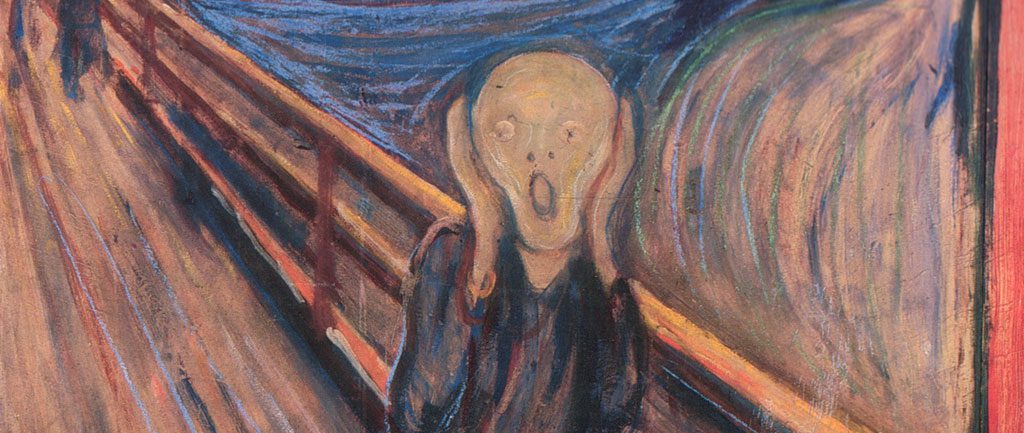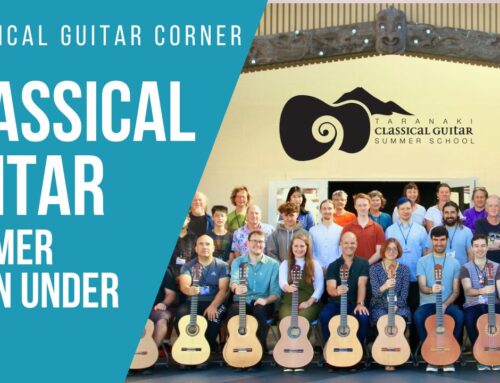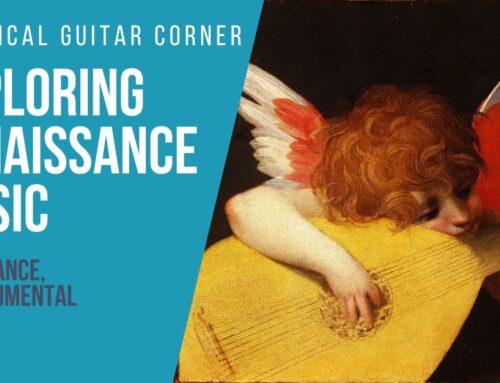Not last night but the night before, I performed at the New York Classical Guitar Society. The first few minutes was playing with my student, Sarah. I was very impressed at her courage and preparation as she had never performed as a duo before. We played this Carulli Duet in G.
Following our duet, I performed two pieces. Valse No.3 by Barrios and the third Bagatelle by William Walton. It wasn’t a train wreck, but it wasn’t something that left me feeling good either.
Its a funny thing, but to be honest, the time when I feel most nervous about performing is at a guitar society. There is no where else that will get my nerves pinging more than the Sydney Classical Guitar Society, which is where I got my early performing experience as a teenager. I can only imagine that my early mindset, fears, trepidations and insecurities are somewhat ingrained into that place, which I now hold very dear. I hadn’t performed for a few months as I am dedicating a lot of time to this site and I also have been asked to perform on the society concert series in the Fall, so I felt and extra bit of pressure to live up to whatever I have built in my mind.
Physiologically I could feel my heart rate and I had very cold hands too. None of these things were extreme, but they were noticeable. I had considered going outside to practice but I wanted to stay and support my colleagues by being an audience member.
The Barrios is a recent piece that I have revisited and the Walton is a piece I have been playing for several years so I expected a couple of practice sessions would be sufficient. Nonetheless, I could play them well at home.
So, there is the knowledgable guitar crowd, a sense of expectation to deliver at your best, cold hands, no warm up and questionable preparation.
OK, we have set the scene Let’s get down to business.
Perspective and affirmation.
Firstly, I need to acknowledge that I will always be the least capable at listening to my performances objectively. In fact, without a recording I can usually only remember the memory slips, mistakes and misses. We need to know and constantly remind ourselves that our perspective is colored and an unreliable critic to pay attention to. My inner critic reminds me of the two grumpy men in the muppets, always having something snide to say and never positive.
On the night I tried to follow my own advice and when I received a compliment from someone, I simply said thank you and resisted the urge to give a play by play run down of mistakes. I also try to believe them, that they weren’t just being polite, people legitimately enjoyed the performance. I believe focusing on this and letting go of the self criticism is healthy.
So, to sum up, people found it enjoyable and it may not have been as bad as your selective memory portrays.
Cold hands no warm up.
This one is simple, and I should be more ardent about preparing for success becauseI have been through this before and found a solution that works.
The solution is simply to leave the room with ten minutes to spare and get your fingers moving. It can be a little tricky in some situations, but if you know you are going to perform, perhaps locate yourself somewhere close to an exit so you can be discreet and have a piece of cloth with you to put under the strings (near the bridge) so you can play quietly and not disturb the performance.
In my experience, I try not not warm up by playing the actual piece because it can send your head into a spiral if something goes wrong in the warm up and it will only increase your stress level.
Cold hands come from a restriction of the blood vessels. It is part of the primal flight or fight response that our body goes through in the face of a perceived danger. I think that to counter this process you can make some large arm movements, stretch, or even go for a quick brisk walk to get the blood flowing. Again, you will have to be a little prepared to do this, so think ahead of how you can find some time and space.
Talking of preparation…
Preparation is going to be the biggest contributor to your success.
Success being a feeling that you played your best.
You are going to perform very much like how you practiced. There might be some limited exceptions for those who get severe stage fright, to the point of immobility, but for most of us the preparation you do leading up to the performance will be the biggest indicator of success.
Preparing is going to be common sense for a lot of us and if you are a reader of this site you will have heard me talk about practice many times. The part we often get wrong, is thinking we are prepared, when we are not.
The Barrios Vals was a piece I played about six years ago, and I have re-visited it in the last week. Perhaps too short a time. I aimed to commit it to memory, so there was that extra pressure plus the fact that I was using different fingerings on repeats that were not set in stone. I THOUGHT, it was smooth, prepared and ready to go.
On the night, I missed notes, had some finger tangles because of a the different fingering choices on repeats and in general it just felt a bit rough.
So, the day after the meeting I came home and played into my phone. Here is what it sounded like:
I had not recorded myself before the performance, and even though the actual night was a stronger showing than in this recording, it is very revealing. Most of the hesitations, and slips were in the same places, and the piece simply is not comfortable yet. An ear opening process.
In the Bagatelle, I had a memory slip. It wasn’t terrible, but it was at the very point where I had identified a memory weakness in the days leading up to the performance. Needless to say, I had not prepared it as well as I thought or needed.
How do you perform at your best? Preparation, preparation, preparation.
Practicing performing.
Lastly, and most under-rated. We often practice practicing, and we perform for ourselves (run throughs) but it is not all that common to perform in public. All of the physiological effects we feel, all of the stress, and also knowing when we really are prepared sufficiently can be improved and controlled with time and experience. It is unreasonable to expect one performance a month or every two months to get us feeling confident and in control.
In my case, I was out of performance practice. I was so grateful to have learned this now, as I have some performances later in the year that mean a lot to me. I am going to be putting myself in front of an audience more often, even if that means asking my students to listen after a lesson!
I hope this personal reveal strikes a chord with you. I believe that professional, amateur, beginner, advanced, we all share so much and have so much in common that it is foolish to think we are different.
If you have your own experiences to share please write them in the comments below!
Thanks to John Custodio for submitting the question on Facebook
Simon





One of the best I have read on the subject.
HI Simon , i love your honesty and thoughts on this subject , performing publically
and playing to ourselves at home are polar opposites
Thanks, Alan. I think we are all in the same basket when it comes to this (and a lot of other things come to think of it!)
-Simon
Your comments made a lot of sense to me. I particularly liked the one about performance practice. I get extremely nervous and really flubbed up in a duo at our last recital, which we have twice a year. I lost it and could not get back into the song; my partner had to finish alone. We have another recital scheduled for June 7th and I so badly want to perform well for this next one. I’m practicing a lot, but like your idea about performing for others as an advance preparation. Perhaps advance playing more often for family and friends will help me better get through the next recital. Thanks again for your excellent article about the real world of performance.
You are very welcome, Ann! I think if I had a dog, it would be a very frequent unwilling audience for me :)
Performance anxiety in some sense isn’t entirely a bad thing. But I think that playing often for friends helps. Also my teacher made me a CD of mind preparation (his thesis is on performance anxiety!) Also, I highly recommend the book called “The Inner Game of Music” by Barry Green with Timothy Gallwey. But by far what works for me is daily practice with specific intentions for each practice session. Recording myself is very hard on me as I am very critical.
Hi Nancy,
I totally agree that the nervous energy can help a performance and I too enjoyed “The Inner Game of Music”. Great to hear of the techniques that work for you, thanks for sharing.
Simon
Dear Simon,
Thanks for sharing with us your thoughts about such an important topic. I am a member of a guitar society in London where, twice a year we organize a public concert. You know what is curious? Although I feel very nervous before going on stage I feel twice as nervous during our regular meetings where we play for ourselves, fellow guitarists and friends we’ve known for ages. Two years ago I played in a theater in Lisbon before an audience of two hundred people. My name was on the bill, and ( oh boy!..) I just did not dare to consider stage fright a possibility, and things went just fine. Two weeks later there I was, with jeans and trainers gasping for air in front of less than a dozen brothers in arms, wandering why on earth have I decided to become a classical guitarist in the first place. My hands were still shaking when later we gathered at the local pub. Weird, right? And you know what? Some of my friends feel the same! Please don’t stop the remarkable job you’re doing.
All the best
Oswaldo
Hey Oswaldo, just out of curiosity… Which London guitar society is this? I live in London and I’m looking for one. Thanks.
Great advice, thanks!
A trick I like to use is to open with a couple of pieces that I find rather easy and I know that I can play without having to pay too much attention to them. The reason is because I find stage fright to be a passing phenomenon and after a few minutes playing easy pieces I’m so much more relaxed in front of the listeners.
Hi Simon. Thank you so much for sharing your experience. I could certainly relate to that in regards to a performance late last year. I was performing a piece I did reasonably well at an earlier exam, so maybe I had a false sense of security in my goal of performing it. It was at a soiree run by a guitar teacher (who I see every 2 to 3 months) and he had about 20 of his students to play that afternoon. I live about 500 km from this location , which makes a big weekend of driving. I arrived late, so I had no time for a warm-up. There was a crowd of about 30 people (students and family members) who I reckon were a knowledgeable lot. As it was in front of my peers, I felt I had to do an above average job. The worse thing was that there was a camera and a guy sitting behind it a metre or two in front of me. Not a great environment on top of minimal performance practice! Anyway it wasn’t a great performance and it knocked my confidence a bit. Anyway, I learned a lot from this experience!
I recently played in front of peers and I felt as if my fingers were not mine. A most revealing experience. It gave me a lot of food for thought, but didn’t feel let down but rather energised with a new goal in mind: back to basics practice and more exposure to playing in front of others!
Hi, I am a violinist, your thoughts are so close to my opinions too! Also I would add that one can “practice” the performance by putting yourself in uncomfortable situations. Playing through the piece when having cold arms, having no concentration, feeling sleepy, shoes are tight (usually my stage shoes are quite uncomfortable). So this is helping me sooooo much to practice the feeling of the discomfort while on stage and also to know what to expect.
Thanks for your article!!!
By the way, great playing, I like the touch, the sound ( you know for violinists this is our life goal:)))
Thanks for the comment and the nice words, Lumi.
Peace,
Dave B (CGC team)